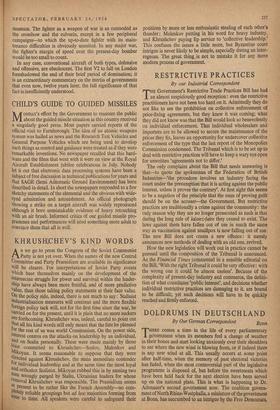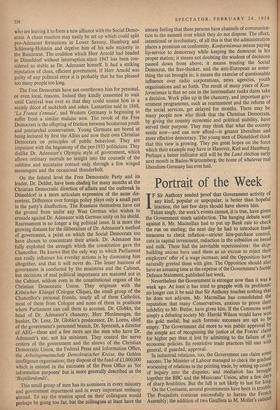DOLDRUMS IN DEUTSCHLAND
By Our German Correspondent Bonn THERETHERE comes a time in the life of every parliamentary when its members feel a change of weather in their bones and start looking anxiously over their shoulders to see where the new wind is blowing from, or if indeed there is any new wind at all. This usually occurs at some point after half-time, when the memory of past electoral victories has faded, when the most controversial part of the legislative programme is disposed of, but before the sweetmeats which have been held back for the next election have been served up on the national plate. This is what is happening to Dr. Adenauer's second government now. The coalition govern- ment of North Rhine-Westphalia, a miniature of the government at Bonn, has succumbed to an intrigue by the Free Democrats, who are leaving it to form a new alliance with the Social Demo- crats. A chain reaction may easily be set up which could split pro-Adenauer formations in Lower Saxony, Hamburg and Schleswig-Holstein and deprive him of his safe majority in the Bundesrat. The coalition which Herr Arnold had headed in Dusseldorf without interruption since 1947 has been con- sidered as stable as Dr. Adenauer himself. It had a striking reputation of clean, efficient government. If Herr Arnold was guilty of any political error it is probably that he has pleased too many people too long.
The Free Democrats have not overthrown him for personal, or even local, reasons. Indeed they kindly consented to wait until Carnival was over so that they could unseat him in a seemly decor of sackcloth and ashes. Lamartine said in 1848, 'La France s'ennuie', and Western Germany is beginning to suffer from a similar malaise now. The revolt of the Free Democrats is the offspring of friction between boisterous youth and patriarchal conservatism. Young Germans are bored at being lectured by first the Allies and now their own Christian Democrats on principles of public behaviour. They are impatient with the hegemony of the pre-1933 politicians. They dislike Dr. Adenauer's Olympic style of government, which allows ordinary mortals no insight into the counsels of the sublime and maintains contact only through a few winged messengers and the occasional thunderbolt.
On the federal level the Free Democratic Party and its leader, Dr. Dehler, have been chafing for many months at the Christian Democratic direction of affairs and the outbreak in Dilsseldorf is a more articulate expression of the same dis- content. Difference over foreign policy plays only a small part in the party's disaffection. The Russians themselves have cut the ground from under any West German who wishes to crusade against Dr. Adenauer with German unity on his shield. Rearmament is no longer a big political issue. It is more the growing distaste for the illiberalism of Dr. Adenauer's method of government, a point on which the Social Democrats too have chosen to concentrate their attack. Dr. Adenauer has fully exploited the strength which the constitution gave the Chancellor. He knows that the only way in which Parliament can really influence his everday actions is by dismissing him altogether, and that it will never do. The lesser business of government is conducted by the ministries and the Cabinet, but decisions of real political importance are matured not in the Cabinet. seldom even in the constitutional organs of the Christian Democratic Union. They originate with the Kolnischer Kliingel (Cologne Clique), the small group of the Chancellor's personal friends, nearly all of them Catholics, most of them from Cologne and none of them in positions where Parliament can call them to account. Dr. Globke, the head of Dr. Adenauer's chancery, Herr Pferdmenges, the banker, Dr. Lenz, Dr. Globke's predecessor, Dr. Loens, chief of the government's personnel branch, Dr. Spenrath, a director of AEG—these and a few more are the men who have Dr. Adenaudr's ear, not his ministers. They control the' nerve centres of the government and the sinews of the Christian Democratic Union, the Federal Press and Information Office, the Arbeitsgemeinschaft Denwkratischer Kreise, the Gehlen intelligence organisation; they dispose of the fund of £1,000,000 which is entered in the estimates of the Press Office as 'for information purposes' but is more generally described as the 'Reptilienfonds'.
This small group of men has its nominees in every ministry and government department and in every important embassy abroad. To say the trusties spied on their" colleagues would perhaps be going too far, but the colleagues at least have the uneasy feeling that these persons have channels of communica- tion to the summit over which they do not dispose. The effect, intentional or involuntary, of all this is that the administration places a premium on conformity. Konformismus means paying lip-service to democracy while keeping the democrat in his proper station; it means not doubting the wisdom of decisions passed down from above; it means treating the Social Democrat, the free-thinker, and the anti-European as some- thing the cat brought in; it means the exercise of questionable influence over radio corporations, news agencies, youth organisations and so forth. The result of many years of Kon- formismus is that no one in the intermediate ranks dares take a decision. Work piles up in the chancery, and important gov- ernment programmes, such as rearmament and the reform of the social services, get delayed for months. There may be many people now who think that the Christian Democrats, by giving the country economic and political stability, have served their purpose. They may think that what the country needs now—and can now afford—is greater liberalism and more effective democracy. The young men of Dusseldorf think that this view is growing. They pin great hopes on the force which their example may have in Hanover, Kiel and Hamburg. Perhaps a better indicator still will be the Land election early next month in Baden-Wurttemberg, the home of whatever real liberalism Germany has ever had.



































 Previous page
Previous page